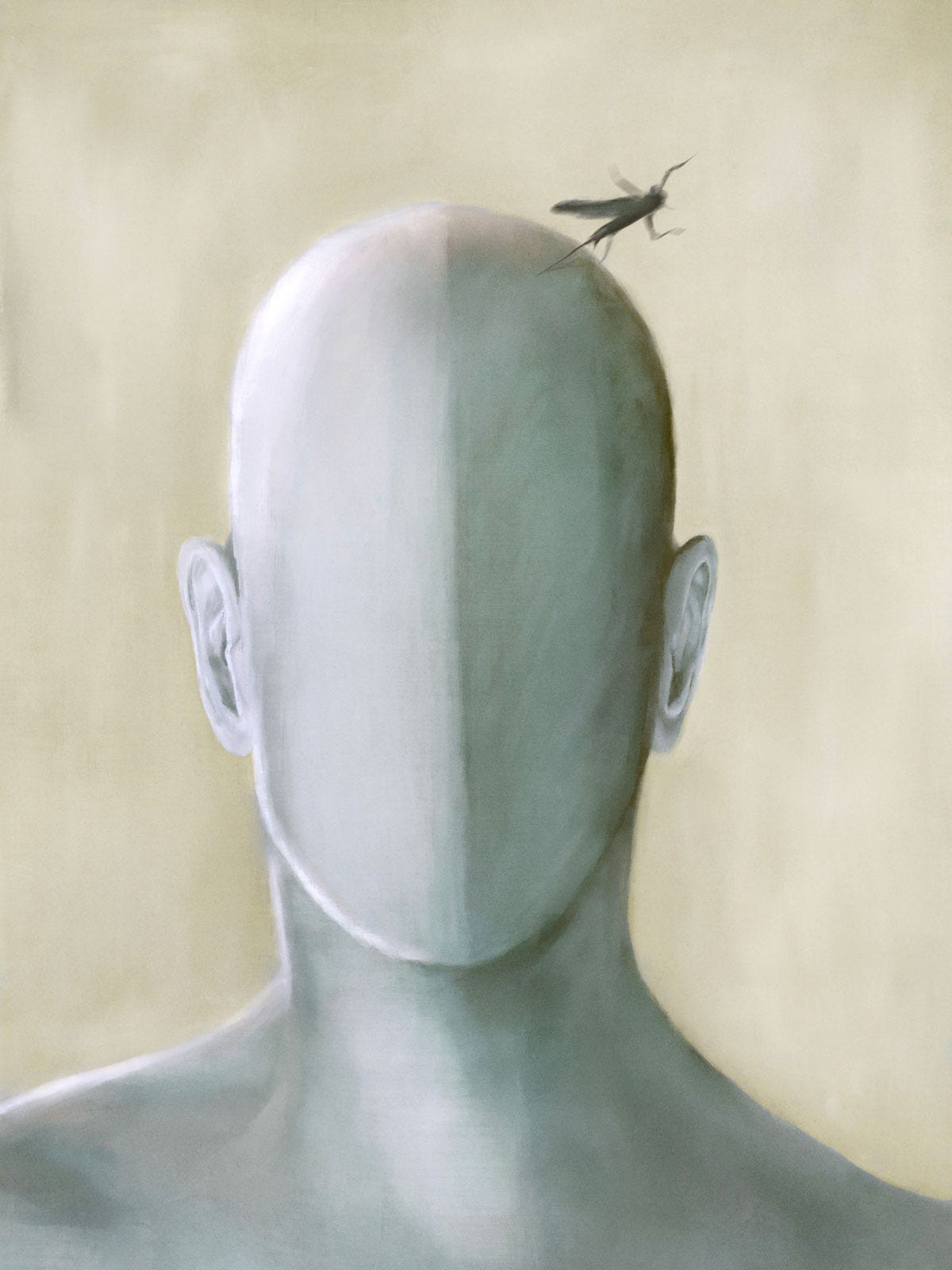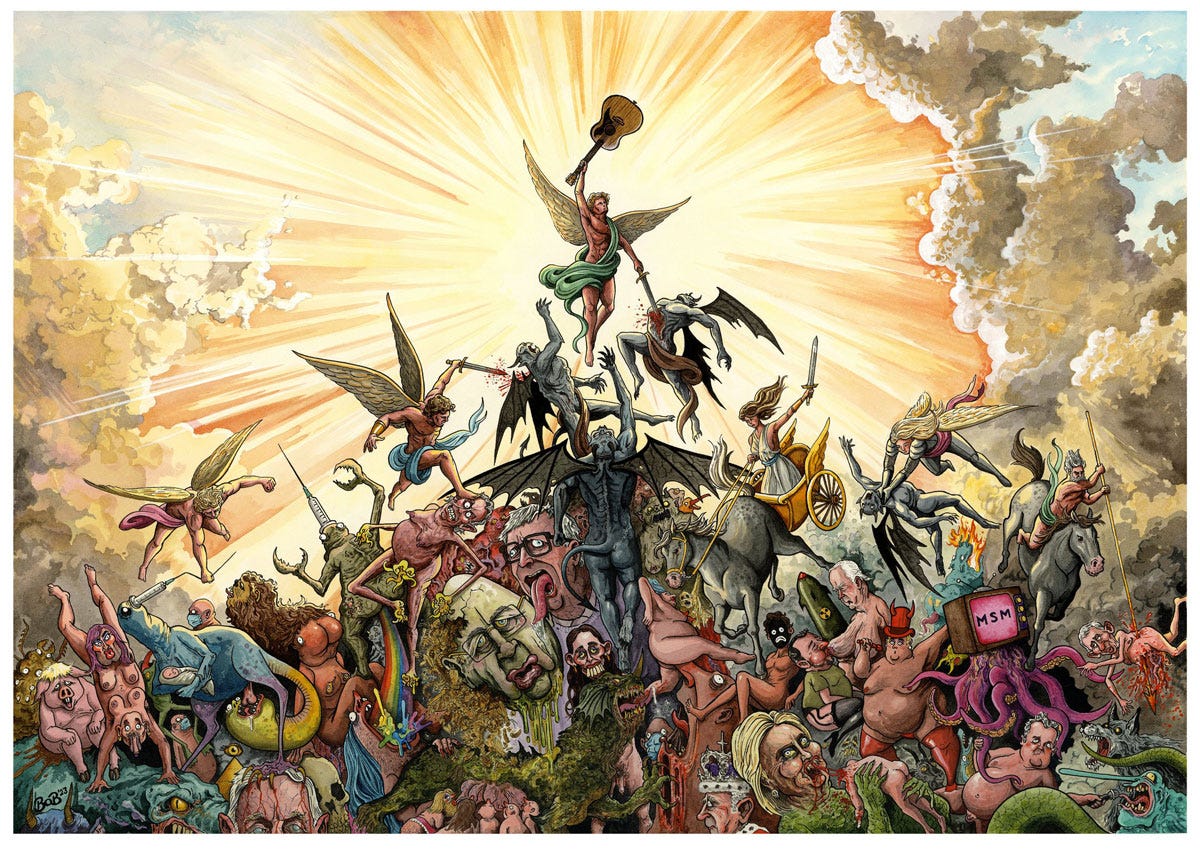Bonus Poem: A Streak of Mean & Reflections on Finger-Pointing
by Margaret Anna Alice. Originally published on her Substack.
We are at a fragile moment in the life of the Resistance, and it seems people’s nerves and judgment are fraying the longer the war wears on. Pissants scatter dispiriting remarks about like litter. Fanatical contingents accuse anyone who holds a different view of being controlled opposition. Self-righteous inquisitors feel they have the right to tell you what you should and shouldn’t write about, how you should and shouldn’t spend your time. Purported allies ambush individuals of supreme integrity, a hazardous practice Mickey Z. described to me as “doing the enemy’s work for them.”
Below are two poems that emerged from not only my own experience of being targeted by a narcissist but also from witnessing reckless allegations being leveled at friends who, like me, have no time for this foolishness because they are too busy combating genuine scoundrels with book-length rap sheets of documentable crimes.
There are people who shine like the sun, and there are people who try to steal that sunshine because they have no light of their own. If they would simply adopt the Golden Rule of do-unto-others and focus on kindling their own embers, there would be a lot less friendly fire and a lot more healing hugs and rejuvenating laughter.
This is a summons to do better, to be better, to transcend our academic differences and unite over the bedrocks we can agree on: saving lives and overthrowing tyranny.
Rites of the Tear-Downers

I understand why the narrative-believers
dismiss, discount, and despise
the truth–speakers: menticide.
I understand why the injected
duck, dodge, and deny
the evidence-collectors: fear.
I understand why the trolls
mosquito-bite, spitball, and hair-pull
the freedom–defenders: hate.
I understand why the propagandists
slur, scorch, and snipe
the corruption–exposers: bribery.
I understand why the politicians
kafkatrap, quarantine, and terrorize
the tyranny–resisters: blackmail.
I understand why the agencies
bully, degrade, and shame
the policy victims: corruption.
I understand why the governments
surveil, silence, and strong-arm
the critical thinkers: power.
I understand why the corporations
fact-choke, blitz, and bot-attack
the dangerously credible: profit.
I understand why the philanthropaths’
string-pullers, puppets, tyrants, and figureheads
concentrate the noncompliant: depopulation.
I don’t understand why those who claim to value truth, freedom, and love
purity-test, subvert, and side-stab those fighting totalitarianism with them.
I don’t understand why they castigate, insinuate, and berate
those accomplishing substantive strides toward our mutual goals.
I don’t understand why they squander life pummeling down instead of lifting up,
dividing instead of uniting, demoralizing instead of inspiring.
I’m not talking about those sharing verifiable proof of bad actors
or calling out a supposed ally for demonstrable harm.
I’m talking about the ones who presume
the power to see into others’ hearts;
the ones who proclaim the words, actions, and life’s work
of others mere masks for maleficent motives;
the ones who purport the ability to identify
the fakes, the frauds, and the phonies;
the ones drenched in paranoia, bitterness, and envy.
You know the ones.
Don’t they have any beauty to scatter,
like nasturtium seeds in a fallow meadow?
Don’t they have any wisdom to spread,
like worm castings over hungry soil?
Don’t they have any truth to drizzle,
like summer rain caressing the earth?
Don’t they have any hope to shine,
like sunlight coaxing seedlings skyward?
If they were infused with the joy of creation,
the pride of work well-done,
the satisfaction of collaboration with kindreds,
there would be no room left
for suspicion,
for spite,
for sabotage.
Their spirits would be brimming with gratitude,
their minds spinning with ideas,
their feet pattering to the next project.
They would awaken to each day
with the zeal of an otter eager to swim,
a runner lacing up her shoes,
a visionary sketching an invention.
They would be too busy
forging their own path
toward their singular mission
to notice the foibles of
others.
They would be too wonderstruck
to wallow,
to whine,
to whisper.
So what if we don’t agree on everything?
We’re explorers, not followers.
So what if we don’t think the same?
We’re water, not stone.
So what if we don’t trod the same trail?
We’re mapping, not paving.
The tear-downers fill
their moody minds
with phantasms,
their vacant souls
with gossip,
their hollow hearts
with carrion.
They are bulimics
who can never
feel sated;
addicts who
can only find
stimulation outside
themselves;
agnosiacs who
babble gibberish
because meaning
escapes them.
They whip their chainsaws
through limbs
like a toddler
stomping on snails.
They deem themselves gods,
all-seeing,
all-knowing,
end-alling.
They are the righteous heroes
of their narcissistic fantasies,
stepping-stone their way up
on the carcasses of their slain.
They sell scalps
for sway,
stories
for spotlights,
skins
for silver.
Soon,
there will be no
one left to
spear,
no one left
to solicit,
no one
left to swindle,
no
one
left.
And that is how
the tear-downers
clearcut a forest,
that is how they
smother a fire,
that is how they
find themselves
alone
in a wasteland
of their own
tearing.
A Streak of Mean

Some people have a streak of mean running through them.
A lightning bolt of vicious.
A circuitry of bile.
You feel the hum
of their electric fence
like a rattle on a snake
You smell the stench
of their singed sacrifices
like a goat on a pyre
You hear the crackling
of their voltage
like a fireworks finale
You taste the metal
of their current
like a gadolinium dye
You see the sparks
of their explosion
like a Peléan eruption
All you can do is
fly
All you can do is
float
All you can do is
free yourself
Of the ground
before it’s ash
Reflections on Finger-Pointing

“We must, indeed, all hang together or, most assuredly, we shall all hang separately.”
—Flemish proverb
You may have noticed I never make accusations about people being controlled opposition, chaos agents, spooks, or the like. That’s not to say they don’t exist. To suggest so would be naïve.
But if you’ve read even a smidgeon of my work, you’ll know I’m all about the evidence. If I make a claim, I back it up with references so you can investigate for yourself.
Unless there’s a smoking gun proving they are guilty of egregious harm, I try not to say anything that would damage the reputation or relationships of someone who is joining hands to annihilate autocracy.
To me, it’s more important to avoid hurting a potentially innocent person than it is to practice a Neo-McCarthyistic witch hunt for heretics.
That doesn’t mean there isn’t a place for healthy questioning. But questioning based on cogent reasons is different from tossing around allegations like a frisbee—or more fittingly, a boomerang.
If someone has proven their mettle on the battlefield of truth, I start from a position of giving them the benefit of the doubt and only reconsider in light of strongly compelling proof.
Practicing optimism about a perceived ally may strike some as gullible. I get that, and I certainly keep my spidey sense on high alert when it comes to strangers. My intuition about a person’s trustworthiness and authenticity has rarely failed me, and it doesn’t take long to spot someone with ulterior motives.
People’s actions and words reveal their character. And even then, how do you know what’s happening in their private lives, in their minds, and in their hearts?
And if we’re talking about a public figure, how do you know how much of your perception is manufactured (whether positive or negative) versus the flesh-and-blood reality?
I realize starting from a position of faith in humanity despite considerable examples to the contrary puts one at greater risk of disappointment or betrayal, but I’d rather take that risk than lose out on the opportunity for a meaningful relationship.
It’s like taking on the responsibility of caring for another sentient being. Those of us who have suffered the bitter agony of losing a precious cat, dog, bird, or other beloved companion can either evade such bonds in the future for fear of the inevitable loss to come—or we can embrace the joyous gift of their existence in the present moment, even while knowing they, like we, are mortal, and we’re “in for some dreadful grief.”1
That’s called love.
I scribbled these meanderings down a couple of months ago, only to discover the Princess of Scientific Rigor, Dr. Jessica Rose, shares my perspective on this and articulated it gracefully in Who are the good guys? and Optimizing outcomes by thinking the best of people.
In the latter, she writes:
“Ultimately with people, my strategy is basically to think the best until I have proof that they are crapola. And by crapola, I mean someone who really is consistently intent on hurting others.”
B-I-N-G-O.
As I wrote in my comment to her:
“YES, Jessica. This has been my philosophy precisely. I don’t engage in gossip or accusations of controlled opposition because I’m not going to waste energy on something that only divides our efforts and saps focus/energy from what really matters. If someone has hard, verifiable evidence of malice, that’s one thing, but if it’s just someone speculating, I ignore it and stay focused on my mission to end tyranny and democide.
“As I previously shared, this giving-people-the-benefit-of-the-doubt attitude did backfire in one situation where I did not realize I was dealing with a narcissistic covert aggressor with histrionic personality disorder, so I had to recalibrate my perception when I was presented with evidence of her concerted efforts to harm me along with documentation showing she had been lying to me for over a year.
“That said, I am not going to let that negative experience cause me to close my heart to other allies in the MFM, 99.8 percent of whom have been overwhelmingly wonderful. Instead, I have been reading books like In Sheep’s Clothing, 5 Types of People Who Can Ruin Your Life, and The Narcissist’s Playbook so I can better identify the patterns and red flags when they come up.”
I then closed by sharing something I wrote in a private thread around a year ago to someone who had proposed the idea of creating a controlled opposition scorecard:
“I love systems, and this is a cool idea, but TBH, I think it is basically an intellectual game that tears down rather than building up the Resistance. Unless we have concrete evidence of someone being controlled opposition, it is nothing more than speculation, and the risk of harming someone who is genuinely doing good work is too high.
“Look at Mike Yeadon. He could easily be accused of being controlled op because of his three-decade career in the pharmaceutical industry, but he is wielding his extensive, deep, relevant knowledge to raise the alarm bell about democide and encroaching tyranny. He gets 1,000+ points of net good to counteract any demerits he would rack up on the controlled op scorecard.
“We are already dealing with destructive rifts in the movement, negativity, bitterness, envy, pride, and attacks/counterattacks. What we need right now is unity, harmony, and love, not more division. I have been called controlled opposition enough times to know it is a silly game because no one knows what’s in your heart.
“When trolls invade discussion boards and start accusing some of the most effective voices of being controlled op, it is actually more likely that they are controlled op. As I wrote in Dialogue with a Divider, I believe in redemption, so I’m not going to discount someone because of their background if they are making phenomenal contributions to the truth movement.
“We need people from the dark sectors (pharma, deep state, etc.) to summon the bravery to step forward and expose the corruption in their organizations. I do realize there are fake ‘whistleblowers’ like the Facebook one who testified before Congress. All you need to do is look at the sum product of their efforts. In that case, it was used to justify a heightening of censorship, so that is immediately suspect.…
“Ultimately, the question is how do you want to spend your time—on negative or positive actions? Are you working from a place of love or fear? What are your goals in life, and is it furthering those goals, or is it a diversion from more meaningful actions? I’m not talking about you personally, but rather using this as an opportunity to gain clarity about our mission, motivation, and actions.
“I have a limited supply of time, energy, and life, so I carefully select what I spend those resources on and make sure it advances my overriding mission to unmask totalitarianism, awaken the sleeping before tyranny triumphs, and end democide. If a project doesn’t contribute to those goals, I try not to waste my time on it so I can concentrate on what elevates, inspires, awakens, and liberates people.”
Maybe
When faced with the prospect of judging whether something unfamiliar is good/bad, true/false, or positive/negative before I’ve had a chance to review the available data, my default is generally, “Maybe.”
I am okay with gray areas, with ambiguity, with the understanding that I can never definitively know something with 100-percent certainty. I’m fine with saying, “I don’t know.”
While untangling the topic of accusations with a reader, I wrote:
“My general rule of thumb when assessing claims like this is to examine the net actions of the accused versus the accuser. Who is focused on doing good work and taking on genuine threats like tyrants, philanthropaths, and colluders, and who is spending their time attacking those within the movement, usually garnering clicks and attention in the process? Who is building up versus tearing down? Who is uniting versus dividing? Who is inspiring versus gossiping? It usually becomes pretty clear who is contributing to the overall cause as opposed to those who are sowing FUD; encouraging in-fighting; and distracting from the causes of resisting tyranny and ending democide.
“In this case, there does appear to be an attempt to take down multiple effective individuals and organizations through a guilt-by-association domino effect, with RFK Jr. even being dragged into the mix, which does suggest there could be more dubious forces at play.”
For those unfamiliar with the term “FUD,” it stands for “fear, uncertainty, and doubt.” The Scholarly Community Encyclopedia entry reads:
“Fear, uncertainty and doubt (often shortened to FUD) is a disinformation strategy used in sales, marketing, public relations, politics, cults, and propaganda. FUD is generally a strategy to influence perception by disseminating negative and dubious or false information and a manifestation of the appeal to fear.”
Whisper campaigns are FUD in action. Covert aggressors don’t need documentation for any of their claims; all they need do is plant the seeds of FUD in a person’s mind and let them slowly take root, fertilizing them with additional lies over time.
Here are some practices I follow to help defend against FUD:
- Follow the Golden Rule. Let’s say Person A accuses Person B of being a “bad actor.” How would you feel if someone said that about you? How would you want the recipient to respond?
- Ask for proof. If they have nothing to support their claims and it is simply a “feeling” they have, case closed. If they do provide something substantive, the next step would be to vet that evidence carefully, understanding that a human being’s reputation hangs in the balance.
- Get the other side of the story. If possible, ask the accused for their side of the story. Narcissistic abusers want you to believe their version of reality, so the last thing they want is for you to talk to their active target. They may even try to dissuade you from doing so as a way of protecting themselves and their lies.
- Trust your gut. You may have had a positive view of Person B before Person A came along and started FUDding you. Don’t automatically abandon the opinion you have developed of a person over time just because you’ve heard a rumor. If someone badmouths someone I respect, that will make me reevaluate the gossiper rather than the victim.
- Don’t get sucked into the drama. If you don’t have time to investigate the claims, remain neutral. Don’t let the FUDder emotionally manipulate you into participating in the drama.
- Be an upstander. If you feel someone has been falsely accused, stand up for that person and let them know, as Mickey Z. and Alicen Grey did when a high-conflict personality began covertly attacking me. I, in turn, was grateful for the opportunity to be an upstander when a dear friend and one of the most effective forces battling authoritarianism and democide was smeared.
As critical thinkers, we don’t need gatekeepers. Just as we don’t outsource our thinking to “experts” and fact-chokers, we don’t need anyone telling us whether someone is trustworthy. We can assess the clues and figure that out for ourselves.
And if someone is controlled opposition, an agent provocateur, or some other type of bad actor, so what. They can only wreak as much damage as we permit.
Just like with the injections. The corporations could manufacture enough shots for every person in the world ten times over. If we all say NO, it doesn’t matter.
We may not be able to stop the threat at the source, but as autonomous beings, we can take responsibility for our own knowledge, decisions, and actions. And if we each focus on our own locus of control, together, we can wipe away the grease of compliance and bring the wheels of fascism to a screeching halt.
“Maybe” applies not only to gauging people and claims but also to circumstances.
One thing I’ve learned repeatedly throughout my life is adversity can often transubstantiate into strength—especially if you embrace Stoic practices like radical acceptance and the obstacle is the way, or, as Homer Simpson says, “crisitunity”:
Situations that appear negative at first might turn out to be positive or vice versa, hence the wisdom of refraining from judgment.
The Taoist parable of the Chinese farmer captures this mindset succinctly, my favorite rendering being by Alan Watts:

Alan reminds us:
“The whole process of nature is an integrated process of immense complexity, and it’s really impossible to tell whether anything that happens in it is good or bad—because you never know what will be the consequence of the misfortune; or, you never know what will be the consequences of good fortune.”
Whatever you want to call this complex ecosystem that has arisen out of a desire to understand reality, to reclaim our diminishing liberties, and to save lives, we are a distributed network of individuals each following our own paths in pursuit of shared objectives.
And that is our strength.
I may use terms like the “Resistance” and “Medical Freedom Movement” because I need a way of describing this loose collection of truth-seekers, but we have no allegiance to a particular ideology or leader.
That, too, is our strength.
It means that if someone perceived as a leader does indeed turn out to be a deceiver, a criminal, a hypocrite, a spy, or whatnot, the movement doesn’t crumble when they’re found out—as hard as the propagandists will try to use it as an opportunity to discredit us.
But we know better than to believe their tricks and lies, and we will remain resolute.
I consider defeating totalitarianism my prime mission—even over ending democide—because it is that all-encompassing, inescapable mother ship that makes all of the daughter ships possible.
Ideologues want to quibble about theoretical differences in the middle of the railroad track while the train is barreling toward us. We can stand there arguing and get flattened by 2030, or we can begin dismantling the tracks.
Everyone has a different idea of how to dismantle those tracks. I don’t tell anyone else how to do their part, and I expect them to afford me the same courtesy. You never know which method will succeed at striking the lynchpin, so the more strategies we try, the better.
Our karass comprises millions of ordinary individuals all over the world, and more people are awakening daily.
With everyone bringing their own expertise, knowledge, talent, and skills, we each have something unique to contribute. We multiply our power exponentially by exchanging valuable information and pursuing our joint aims from different angles and directions.
We are individual starlings in a murmuration, all working toward abolishing tyranny.
So let us treat one another with kindness, with understanding, with grace. Let us focus on our own gifts, our own inspirations, our own passions. Let us aim our sharp words at the criminocrats, not one another. And let us raise one another up, our fingers interlocking to form an unbreakable bond of ungovernability even the instigators cannot rupture.

Addendum
As I was proofreading this piece, an email from a reader arrived with these lines:
“In this day and age everyone always seems to have an ulterior motive or thinks everyone else does. You can’t even go to the grocery store and smile at the cashier without them thinking it implies something, even when you’re 40 years older than them.”
It was so apropos for this essay, I asked his permission to include it.
He succinctly captures the climate of paranoia, suspicion, and cynicism that permeates the world today. Do we really want our subculture to reflect the jaded low-trust society surrounding us?
We are here because we are driven by love, not fear; light, not darkness; truth, not lies. Why not make this an oasis of geniality, a refuge where people can freely express their thoughts and feelings without worrying someone is going to rain wrath upon them for wrongthink? That doesn’t mean ideas will go unchallenged, but that can be done respectfully—as allies, not antagonists.
Let’s be the community we want to see in the world.
© Margaret Anna Alice, LLC

- Yes, I know this clip isn’t a good representation of what I’m saying, but Paddy Chayefsky deserves credit for the phrasing, which captures the experience of losing a beloved companion excruciatingly well. ↩︎